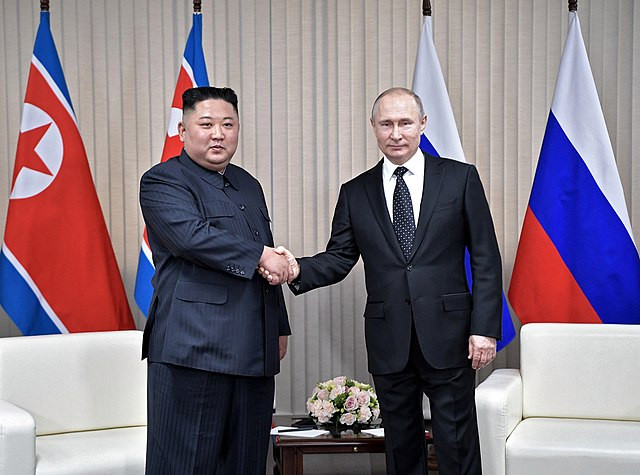Russian President Vladimir Putin is set to visit North Korea on Tuesday and Wednesday, marking a significant development in the burgeoning partnership between Moscow and Pyongyang. The visit, announced by the Kremlin, underscores Russia's intent to bolster ties with the reclusive, nuclear-armed state amidst the ongoing conflict in Ukraine.
North Korean leader Kim Jong Un extended the invitation to Putin during his visit to Russia's Far East last September. Putin's last visit to Pyongyang was in July 2000. This trip is seen as a strategic move by Putin to solidify alliances with countries that share a common animosity towards the West.
Following his visit to North Korea, Putin will travel to Vietnam on June 19-20. Both visits had been anticipated, although the exact dates had not been previously disclosed. The Kremlin's announcement of these trips highlights the strengthening of Russia's ties with North Korea and Vietnam, a development that has raised concerns among the United States and its allies in Europe and Asia.
The United States has accused North Korea of supplying weapons to Russia to aid its war effort in Ukraine, a claim that Pyongyang has repeatedly denied. However, United Nations monitors have concluded that at least one ballistic missile fired from Russia at a Ukrainian city in January was manufactured in North Korea. Ukrainian officials have reported approximately 50 such missiles delivered to Russia by North Korea.
"For Kim Jong Un, this visit is a victory," said Leif-Eric Easley, a professor at Ewha University in Seoul. "Not only does the summit upgrade North Korea's status among countries standing against the U.S.-led international order, but it also helps bolster Kim's domestic legitimacy."
South Korea's vice foreign minister, Kim Hong-kyun, discussed Putin's planned visit to the North in an emergency phone call with U.S. Deputy Secretary of State Kurt Campbell. The South Korean foreign ministry emphasized that the visit should not lead to increased military cooperation between Pyongyang and Moscow, which would violate U.N. resolutions.
Despite these concerns, Russia has stated that it will develop its relations with North Korea as it sees fit, rejecting any external dictates, particularly from the United States. The Kremlin's stance has been clear: "Russia will cooperate with North Korea and develop relations in the manner it chooses."
This visit comes shortly after a summit of the Group of Seven (G7) developed economies in Italy, attended by Ukrainian President Volodymyr Zelensky. Western leaders at the summit reiterated their support for Ukraine and agreed to use profits from frozen Russian assets to back a $50 billion loan to the war-torn country. Additionally, a Kyiv-backed international peace summit over the weekend, attended by over 100 countries and organizations, sought to garner support for Zelensky's vision for peace, which includes a complete withdrawal of Russian troops from Ukrainian territory.
In response, Putin reiterated his own peace conditions, which include the withdrawal of Ukrainian troops from four partially occupied regions and the abandonment of Kyiv's bid to join NATO. These demands have been deemed nonstarters by Ukraine and its allies.
Putin's visit to North Korea is seen as an effort to further consolidate Kim's support for Russia's war effort, especially as delayed American military aid for Ukraine begins to take effect. U.S. Secretary of Defense Lloyd Austin recently informed American lawmakers that North Korean munitions and missiles, along with Iranian drones, had helped Russian forces regain their footing.
Between August and February, Pyongyang shipped approximately 6,700 containers to Russia, potentially containing over 3 million rounds of 152 mm artillery shells or more than 500,000 rounds of 122 mm multiple rocket launchers, according to South Korea's defense ministry. Both Moscow and Pyongyang have denied these arms transfers, with a senior North Korean official calling such allegations an "absurd paradox."
When asked about concerns regarding the transfer of sensitive technologies to Pyongyang, a Kremlin spokesperson said that the countries' potential for developing bilateral relations is "profound" and "should not cause concern to anyone."
Putin's travel to North Korea, his first since 2000, comes as the Russian leader seeks to reassert his presence on the global stage amidst his country's controversial invasion of Ukraine. Last month, Putin visited Beijing, where he and Chinese leader Xi Jinping affirmed their shared opposition to what they perceive as a U.S.-led world order. Additionally, Moscow recently hosted foreign ministers from China, Iran, South Africa, and Brazil for a BRICS meeting.
For Kim Jong Un, the visit from a leader of a permanent member of the United Nations Security Council provides a significant boost to his domestic standing. It also presents an opportunity for North Korea to secure much-needed economic and technological support from Russia. Despite years of international sanctions over its illegal nuclear weapons program, North Korea has remained steadfast in its defiance.




